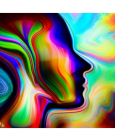Psychiatry
Psychedelics: Subjectivity in the Therapeutic Response
A new perspective on an age-old debate.
Posted May 21, 2024 Reviewed by Abigail Fagan
Key points
- Psychedelic-assisted therapies bring a critical new dimension to questions about subjectivity in psychiatry.
- A nuanced understanding of the objective and subjective is needed for the adoption of psychedelic therapies.
- Such can play a wider role in advancing psychiatry and psychotherapy.
By Benjamin Kelmendi, M.D.
One can only speculate what Galileo must have felt when he first gazed through his telescope, seeing the reflection of the Milky Way for the first time. The sentiment of the age-old question “to look or not look through Galileo’s telescope” continues to echo and resonates deeply in psychiatry regarding the role of subjectivity in understanding the ever-changing contextual factors of the human condition.
Subjectivity is an intimately personal and unique experience of how an individual interprets the world from within and without. It is thus not surprising that it has long been a topic of debate in the field of psychiatry. The reemergence of psychedelic therapies has reignited the debate by emphasizing the importance of the direct, first-person perspective and leveraging the subjective experiences of patients.
As the field grapples to understand the underpinnings of the therapeutic effects produced by a single dose, it is simultaneously confronted with the question of how to interpret and value the profound subjective effects elicited by psychedelics. The challenge posed by such questions invites interdisciplinary perspectives and has become increasingly relevant as the clinical development of the therapies advances along with the potential for wider adoption.
Psychedelic compounds are known to induce a wide range of subjective effects, including altered sensory perception, enhanced introspection, emotional intensification, and mystical-type experiences. The subjective drug experience is highly variable and can be influenced by various factors, such as dose, setting, and individual differences in personality, cultural context, expectation, and prior experience.
With the rise of behavioral science and biomedical models in the mid-20th century, psychiatry shifted its focus from the perceived subjectivity of psychoanalysis to observable symptoms and behaviors, aiming to establish itself as an objective and scientific field. At the outset, the approach was not dismissive of the significance of subjective experience in an individual’s interpretation of the world or its role in the therapeutic process, but the variability of highly personal experiences made them challenging to quantify and investigate using objective scientific methods. Distancing itself from subjectivity was seen as a necessary step to scientifically advance the field and develop evidence-based interventions that can be easily integrated into mainstream medicine.
Thus, it is not surprising that the current dominant model in psychiatry has led to a debate over the role and value of subjective psychedelic experiences, resulting in two camps. One camp acknowledges the profound importance of subjective effects on patients' narrative about therapeutic improvement but contends that the subjective experiences are difficult to quantify and introduce bias that complicates objective analysis. As a result, subjective experiences are limited in their generalizability and potential for integration into mainstream healthcare practices.
The other camp highlights the therapeutic benefits associated with patients' experiences, noting that such experiences have been shown to facilitate profound changes in self-perception and worldview, leading to significant improvements in mental health. The subjective experience is seen as integral to the therapeutic process and clinical improvement.
This dichotomy is not simple to resolve. As Kierkegaard eloquently put it, “to venture causes anxiety, but not to venture is to lose oneself”.
There is, thus, an invitation and need for a nuanced exploration of how best to strike the balance in embracing the value of both objective and subjective aspects of psychedelic therapies as the field looks to gain a better understanding of the human condition and the world around us, and to fulfill its potential as a new paradigm in the treatment of complex mental health challenges. Much like the way Galileo's telescope opened up new possibilities and perspectives, acknowledging and embracing subjectivity and subjective drug experiences in psychiatry may lead to important advancements in mental health treatment.
Benjamin Kelmendi, M.D., is an assistant professor of psychiatry at Yale University and co-director of Yale Psychedelic Sciences Program. His work focuses on elucidating the mechanism of psilocybin using neuroimaging and exploring its therapeutic potential in OCD and depression.


